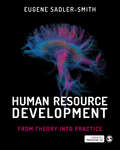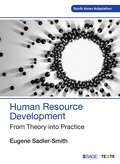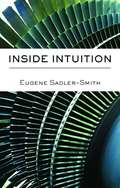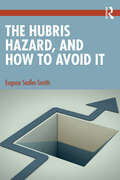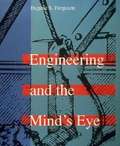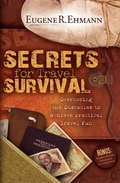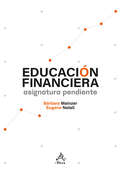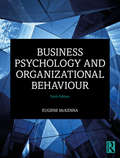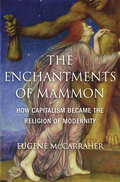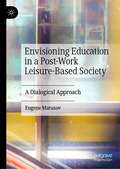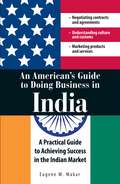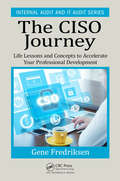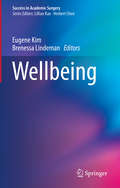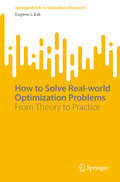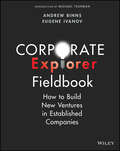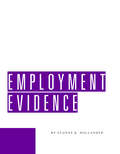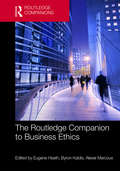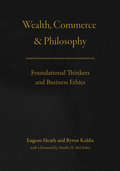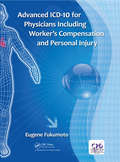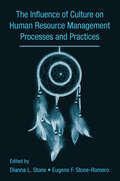- Table View
- List View
Human Resource Development: From Theory into Practice
by Eugene Sadler-SmithCombining theoretical rigor, practical relevance and pedagogical innovation, Human Resource Development: From Theory into Practice is an essential resource for students working towards a career in human resource development (HRD), human resource management (HRM), occupational and organizational psychology, and related areas of business management and organization. Key features: • Aligns with the CIPD Professional Standards and the CIPD’s Level 7 Diploma in Learning and Development. • Covers all the basics in the fundamentals of HRD theory and practice, as well as cutting-edge topics such as the e-learning, ‘hybrid learning’, neuroscience and learning, ‘learning ecosystems’, and the ‘new learning organization’ science of learning. • Follows a unique framework based on the a distinction between ‘micro-HRD’, which zooms-in on the fine detail, meso, and ‘macro-HRD’, which zooms-out to look at the bigger picture. • Includes a rich array of research insights, case studies and examples from a wide range of contexts. • Offers a variety of learning features, including ‘perspectives from practice’ and ‘in their own words’, which help to bridge the gap between theory and practical application. This up-to-date and authoritative textbook is accompanied by a comprehensive instructor’s manual and PowerPoint slides to support lecturers in their teaching.
Human Resource Development: From Theory into Practice
by Eugene Sadler-SmithCombining theoretical rigor, practical relevance and pedagogical innovation, Human Resource Development: From Theory into Practice is an essential resource for students working towards a career in human resource development (HRD), human resource management (HRM), occupational and organizational psychology, and related areas of business management and organization. Key features: • Aligns with the CIPD Professional Standards and the CIPD’s Level 7 Diploma in Learning and Development. • Covers all the basics in the fundamentals of HRD theory and practice, as well as cutting-edge topics such as the e-learning, ‘hybrid learning’, neuroscience and learning, ‘learning ecosystems’, and the ‘new learning organization’ science of learning. • Follows a unique framework based on the a distinction between ‘micro-HRD’, which zooms-in on the fine detail, meso, and ‘macro-HRD’, which zooms-out to look at the bigger picture. • Includes a rich array of research insights, case studies and examples from a wide range of contexts. • Offers a variety of learning features, including ‘perspectives from practice’ and ‘in their own words’, which help to bridge the gap between theory and practical application. This up-to-date and authoritative textbook is accompanied by a comprehensive instructor’s manual and PowerPoint slides to support lecturers in their teaching.
Human Resource Development: From Theory into Practice
by Eugene Sadler-SmithAn immersive textbook that offers readers a comprehensive and detailed introduction to HRD that is theory-based, evidence-driven and practically oriented This textbook combines theoretical rigour and pedagogical innovation to give students and teachers alike an accessible guide to human resource development and its fundamental theories and practices. The book reflects the author's firm belief that learning offers the best competitive advantage and is thus designed to train students interested in HRD into industry-ready professionals. Human Resource Development will guide its readers on how to maximize employees' potential using systematic and systemic approaches to drive individual and organizational performance. Key Features: • Analytical approach to the subject with a checklist framework in each chapter that presents the contents systematically • Follows a unique framework based on the distinction between 'micro-HRD', which zooms-in on the fine details, and 'macro-HRD', which zooms-out to look at the bigger picture • Includes a rich array of research insights, case studies and examples from a wide range of contexts • Covers cutting-edge topics such as e-learning, 'hybrid learning', neuroscience and learning, 'learning ecosystems', and the 'new learning organization' science of learning
Inside Intuition
by Eugene Sadler-SmithWhat isgut feeling and how can it be harnessed? To what extent should business decisions be informed byinstincts which may seem irrational or impossible to quantify? Inside Intuition examines how the latest developments in social psychology and cognitive psychology, as well as exciting new insights from evolutionary psychology and cognitive n
The Hubris Hazard, and How to Avoid It
by Eugene Sadler-SmithHubris is something we’ve all seen in action and experienced all too often. It’s a significant occupational hazard and a serious potential derailment factor for leaders, organisations, and civil society. Hubristic leaders - intoxicated as they are with power, praise, and success–behave in ways that, if left unchecked, invite unintended and unforeseen negative consequences which impact destructively on individuals, industries, economies, and nations.Despite numerous examples throughout history of hubris’ destructive consequences, it nonetheless appears to be an ever-present and growing danger. Many leaders seem to be blind to the hazards of hubris and oblivious to the lessons of history. Prevention is better than cure and understanding the nature of the hubris hazard and the associated risk factors will help leaders and managers improve their personal performance and avoid derailment and, even more importantly, protect the well-being of employees and the resilience of their organisations over the long term. This book explains the characteristics, causes, and consequences of hubris, and shows how to combat the significant hazard it poses to managers, leaders, organisations, and society. With contemporary examples, each chapter explores a particular ‘hubris risk factor’ and shows how the risk can be managed and mitigated and exposure to the hubris hazard minimised.The Hubris Hazard, and How to Avoid It offers practical guidance and action points for managers and leaders on how to recognise hubris in themselves and others and what to do to combat it when it arises. It will also be useful for business and executive coaches and leadership trainers and developers.
Engineering and the Mind's Eye
by Eugene S. FergusonIn this insightful and incisive essay, Eugene Ferguson demonstrates that good engineering is as much a matter of intuition and nonverbal thinking as of equations and computation. He argues that a system of engineering education that ignores nonverbal thinking will produce engineers who are dangerously ignorant of the many ways in which the real world differs from the mathematical models constructed in academic minds.
Secrets for Travel Survival: Overcoming the Obstacles to Achieve Practical Travel Fun
by Eugene R. EhmannLeave the stress and anxiety behind, and learn to enjoy traveling again with these expert tips. Travel can be an adventure, but it can also be overwhelming. Written by an experienced world traveler who also entertainingly recounts his own journeys, this guide can help you feel relaxed and ready to go, whether you&’re on the road for business or pleasure. Learn: * How to prepare for your trip to ensure the results you want * How to plan your trip for the smoothest outcome * How to best move through airport security * How to visit or work in foreign countries where you know little or no local language * How to be and feel safe and secure . . . and still have fun!
Educación financiera: asignatura pendiente
by Bárbara Mainzer Eugene NataliEl dinero está muy presente en nuestras vidas cotidianas. Cada día nos enfrentamos a nuevos desafíos financieros. Tomamos decisiones financieras todos los días. Y, en general, no estamos preparados para tomarlas. Prepararse con tiempo y aprender a pensar en estos temas aumenta las chances de mejorar nuestra calidad de vida. Permite tener más oportunidades y más opciones. Este libro tiene como objetivo ayudarte a tomar decisiones de manera más informada para que puedas construir un futuro mejor. Es una caja de herramientas con la que aprenderás conceptos esenciales sobre educación financiera, una materia poco tenida en cuenta en la formación escolar en nuestro país, pero que consideramos fundamental.
Business Psychology and Organizational Behaviour
by Eugene McKennaBusiness Psychology and Organizational Behaviour introduces principles and concepts in psychology and organizational behaviour with emphasis on relevance and applications. Well organised and clearly written, it draws on a sound theoretical and applied base, and utilizes real-life examples, theories, and research findings of relevance to the world of business and work. The new edition of this best-selling textbook has been revised and updated with expanded and new material, including: proactive personality and situational theory in personality; theory of purposeful work behaviour; emotional and social anxiety in communication; decision biases and errors; and right brain activity and creativity, to name a few. There are numerous helpful features such as learning outcomes, chapter summaries, review questions, a glossary, and a comprehensive bibliography. Illustrations of practice and relevant theory and research also take the reader through individual, group, and organizational perspectives. This is an essential textbook for undergraduates and postgraduates studying psychology and organizational behaviour. What is more, it can be profitably used on degree, diploma, professional, and short courses. It's also likely to be of interest to the reflective practitioner in work organizations.
The Enchantments of Mammon: How Capitalism Became the Religion of Modernity
by Eugene McCarraherEugene McCarraher challenges the conventional view of capitalism as a force for disenchantment. From Puritan and evangelical valorizations of profit to the heavenly Fordist city, the mystically animated corporation, and the deification of the market, capitalism has hijacked our intrinsic longing for divinity, laying hold to our souls.
Envisioning Education in a Post-Work Leisure-Based Society: A Dialogical Approach
by Eugene MatusovThis book is both an analytic and imaginative study of the future role of education in a leisure-based society. Grounded in a philosophical approach that draws on the work of Aristotle, Arendt, Keynes, and others, the volume deconstructs modern work-based society, as well as mainstream institutionalized education, which the author argues have systemically alienated students from their education, authorial agency, and society itself. The author argues for the value of intrinsic education, where the goals are based on students' own needs and interests, imagining new opportunities that can arise from the emergence of such a society.
An American's Guide to Doing Business in India
by Eugene M. MakarChina aside, India is the world's most rapidly growing economy. But cashing in on that opportunity can be as challenging as it is rewarding. Whether you work for a company doing business in India or are an entrepreneur looking to export your goods and services, An American's Guide to Doing Business in India will help you navigate all aspects of this complex market. Esteemed industry consultant Eugene M. Makar offers his proven tips, tools, and techniques to help you: Break into the market, Weigh the pros and cons of investments, Find joint venture partners, Hire local representation.
An American's Guide to Doing Business in India
by Eugene M MakarDid you know that . . .U.S. money pours into India at a rate of over $25 million every day? India's economic growth has averaged 8.6 percent a year since 2004? At this rate, India will become the fifth largest consumer market by 2025 (up from #12 today)? U.S. venture firms will raise $1 billion for India by the end of 2007? U.S. exports to India have more than doubled over the last five years? China aside, India is the world's most rapidly growing economy. But cashing in on that opportunity can be as challenging as it is rewarding. Whether you work for a company doing business in India or are an entrepreneur looking to export your goods and services, An American's Guide to Doing Business in India will help you navigate all aspects of this complex market. Esteemed industry consultant Eugene M. Makar offers his proven tips, tools, and techniques to help you: Break into the market; Weigh the pros and cons of investments; Find joint venture partners; Hire local representation; and more.You'll also learn to recognize key social and cultural differences. From where to bank to what to wear, you'll discover what makes India different-and how you can best position yourself there for success.
An merican's Guide to Doing Business in India
by Eugene M MakarA Simon & Schuster eBook. Simon & Schuster has a great book for every reader.
The CISO Journey: Life Lessons and Concepts to Accelerate Your Professional Development (Internal Audit and IT Audit)
by Eugene M FredriksenThe book takes readers though a series of security and risk discussions based on real-life experiences. While the experience story may not be technical, it will relate specifically to a value or skill critical to being a successful CISO. The core content is organized into ten major chapters, each relating to a "Rule of Information Security" developed through a career of real life experiences. The elements are selected to accelerate the development of CISO skills critical to success. Each segments clearly calls out lessons learned and skills to be developed. The last segment of the book addresses presenting security to senior execs and board members, and provides sample content and materials.
The Pecora Hearings
by David A. Moss Cole Bolton Eugene Kintgen"In late October 1929, Wall Street was badly shaken by what later came to be known as the “Great Crash.” On Black Monday and Black Tuesday (October 28 and 29), the Dow Jones Industrial Average fell from 300 to 230, well down from its peak of 381 on September 3. It ultimately bottomed out at 41 during the summer of 1932. By this time hundreds of banks had failed, prices had dropped dramatically, U.S. real per capita GDP had fallen by nearly 30 percent, and the unemployment rate stood at over 20 percent.1 Many blamed Wall Street for the onset of the Great Depression; and Franklin Delano Roosevelt, who ultimately won the 1932 presidential election by a wide margin, promised to enact strict regulations on the financial community and put “an end to speculation.”2"
The South Sea Company (A)
by David A. Moss Eugene Kintgen Agnieszka RafalskaIn early 1720, the South Sea Company and the Bank of England were competing for the right to issue new shares and to exchange those shares for government bonds that were then in the hands of the public. The British government had already executed two such debt conversion with the South Sea Company. Most individuals who had converted bonds for shares in 1711 and 1719 had seen their South Sea shares appreciate in the meantime, and the government had lowered its debt servicing costs as a result of these two conversions. The conversion under consideration in 1720, however, would be on a much larger scale. In time, the South Sea Company won the bidding war, and the House of Commons approved its debt conversion plan. Now it was up to the House of Lords to approve or reject the deal.
Wellbeing (Success in Academic Surgery)
by Eugene Kim Brenessa LindemanThis book provides a detailed guide for surgeons and surgical trainees on a variety of facets relevant to wellbeing, and how to maintain wellbeing throughout a career in academic surgery. Individual and external factors relevant to wellbeing are both covered in relation to the surgeon. Aspects covered include healthcare roles, personal factors, socio-cultural factors, the regulatory business, and payer environment. Potential strategies for managing welfare including considerations for both students and residents are provided, as are methodologies for studying aspects of wellbeing. Wellbeing offers a practical and personal insight on maintaining wellbeing in academic surgery and is a valuable resource for all practicing and trainee surgeons across a variety of disciplines, as well as those who are interested in studying factors affecting the wellbeing of surgical specialists.
How to Solve Real-world Optimization Problems: From Theory to Practice (SpringerBriefs in Operations Research)
by Eugene J. ZakWritten by an experienced operations research practitioner with a strong applied mathematics background, this book offers practical insights into how to approach optimization problems, how to develop intelligent and efficient mathematical models and algorithms, and how to implement and deliver software products to customers. With a focus on revealing the similarities and differences between academia and industry in mathematical modeling, the book provides useful tips and advice based on the author’s extensive experience as a principal developer working to solve real-world optimization problems for several major high-tech companies.The book offers valuable food for thought for researchers and practical guidance for graduate students preparing for their future projects in the industry. It is also an essential resource for practitioners working in the industrial, business, and service sectors.
Corporate Explorer Fieldbook: How to Build New Ventures In Established Companies
by Andrew Binns Eugene IvanovBuild an innovative new startup using the resources of an existing corporation The Corporate Explorer Fieldbook: How to Build New Ventures in Established Companies is a one-of-a-kind collection of the tools, methodologies, and techniques you need to build successful, market-ready ventures from within existing organizations. The accomplished authors explain how to develop a practical strategy, gather market insights, develop a Jobs-To-Be-Done market canvas, collect customer research, reduce organizational risk, and more. You’ll learn how to beat the odds when introducing a new product or service into the marketplace and how to select, develop, and compensate the right people in your company to act as corporate explorers. Finally, the book explains how to secure authentic and enthusiastic buy-in for your new venture at the executive level. The Corporate Explorer Fieldbook will also teach you to: Conduct micro-experiments to distinguish legitimate business opportunities from ideas that lack traction Perform customer discovery interviews for ideating, incubating, and scaling ideas Generate breakthrough ideas from within large companies An indispensable companion to the newly published Corporate Explorer: How to Build New Ventures in Established Companies, the Corporate Explorer Fieldbook is a must-read, step-by-step guide for corporate entrepreneurs seeking to launch new ventures from within their existing organizations.
Employment Evidence
by Eugene HollanderEmployment Evidence This strategic guide to admission and exclusion gives you foundations, objections, responses, tactics, jury instructions, motions in limine, and supporting authority for all your evidence battles in employment cases. You'll get everything you need to win your battles over EEOC letters, unemployment records, arbitration decisions, past sexual conduct, after-acquired evidence, prior acts of disparate treatment, corrective action policies, disciplinary records, personnel files, defendant's net worth, plaintiffs' medical and psychological history and exams, undue hardship, BFOQs, and much more. Anticipate and circumvent problems in admitting your evidence and exclude/limit what the opposition throws at you. Designed for quick reference with centerfold index, tabbed dividers, shaded tips, boxed objections, argument checklists, tactics by part, and over 750 cases divided by admitting/excluding. In-depth treatment of rules, definitions and distinctions. Nearly every topic supported with multiple forms. This in-depth, easy-to-use, practical book will be indispensable in your employment cases.
The Routledge Companion to Business Ethics (Routledge Companions in Business, Management and Accounting)
by Byron Kaldis Eugene Heath Alexei MarcouxThe field of business ethics continues to expand intellectually and geographically. During the past five decades, scholars have developed and deepened their inquiries into the ethics of commercial and corporate conduct. This Companion provides a novel overview of the discipline of business ethics, covering the major areas of the field as well as new and emerging topics. The eight thematic units range over an extraordinary set of subjects and include chapters on the history and pedagogy of business ethics, moral philosophy, the nature of business, responsibilities within the firm, economic institutions, the 2008 financial crisis, globalization, and business ethics in different regions of the world. Led by a well-respected editorial team, this unique volume gathers an international array of experts whose various critical approaches yield insights from areas such as public policy, economics, law, and history, in addition to business and philosophy. With its fresh analyses, wide scope, and clarity of approach, this volume will be an essential addition to library collections in business, management, and applied ethics.
Wealth, Commerce, and Philosophy: Foundational Thinkers and Business Ethics
by Deirdre N. Mccloskey Byron Kaldis Eugene HeathThe moral dimensions of how we conduct business affect all of our lives in ways big and small, from the prevention of environmental devastation to the policing of unfair trading practices, from arguments over minimum wage rates to those over how government contracts are handed out. Yet for as deep and complex a field as business ethics is, it has remained relatively isolated from the larger, global history of moral philosophy. This book aims to bridge that gap, reaching deep into the past and traveling the globe to reinvigorate and deepen the basis of business ethics. Spanning the history of western philosophy as well as looking toward classical Chinese thought and medieval Islamic philosophy, this volume provides business ethicists a unified source of clear, accurate, and compelling accounts of how the ideas of foundational thinkers—from Aristotle to Friedrich Hayek to Amartya Sen—relate to wealth, commerce, and markets. The essays illuminate perspectives that have often been ignored or forgotten, informing discussion in fresh and often unexpected ways. In doing so, the authors not only throw into relief common misunderstandings and misappropriations often endemic to business ethics but also set forth rich moments of contention as well as novel ways of approaching complex ethical problems. Ultimately, this volume provides a bedrock of moral thought that will move business ethics beyond the ever-changing opinions of headline-driven debate.
Advanced ICD-10 for Physicians Including Worker’s Compensation and Personal Injury
by Eugene FukumotoICD-10 is the 10th revision of the International Statistical Classification of Diseases and Related Health Problems (ICD), a medical classification list by the World Health Organization. It contains codes for diseases, signs and symptoms, abnormal findings, complaints, social circumstances, and external causes of injury of diseases. The code set allows more than 14,000 different codes and permits the tracking of many new diagnoses. The U.S. has used ICD-10-CM (Clinical Modification) since October, 2015. This national variant of ICD-10 was provided by the Centers for Medicare and Medicaid Services (CMS) and the National Center for Health Statistics, and the use of ICD-10-CM codes are now mandated for all inpatient medical reporting requirements. This book is for physicians, practice managers and all others who need learn ICD-10. It’s designed for the clinician to learn how to put their diagnosis into a code and not rely on staff or computer software programs to decide it form them. ICD-10 is a complex system of coding and Medicare and third party insurers have been lenient giving providers a year to get used to the coding system. As a result, physicians and their staff have become very complacent regarding proper coding. However, Medicare and third party insurers will soon begin to deny claims which are not coded correctly, which in turn will cost physician groups time and money. This book focuses on Worker’s Compensation and Personal Injury, a very large segment of the healthcare industry and is a new area to ICD-10. The diagnosis coding for injuries is much different than for Medicare or group insurance and unless the physicians and their staff learn how to use it properly, they risk losing income for themselves and worse, they risk losing the case for the patient.
The Influence of Culture on Human Resource Management Processes and Practices (Applied Psychology Ser.)
by Dianna L. Stone Eugene F. Stone-RomeroIt is clear that organizations are becoming more culturally diverse, and a better understanding of multiculturism and its impact on organizations is needed. This book, with contributions from expert academics, is designed to motivate both the further development of models concerned with the influence of cultural diversity on several Human Resource
